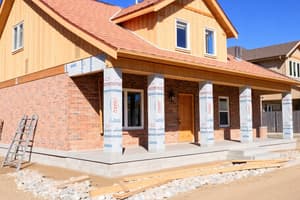Podcast
Questions and Answers
What is the maximum sill height for emergency escape and rescue openings?
What is the maximum sill height for emergency escape and rescue openings?
- 36 inches
- 40 inches
- 48 inches
- 44 inches (correct)
How many layers of underlayment should an ice barrier have in regions prone to ice formation along the eaves?
How many layers of underlayment should an ice barrier have in regions prone to ice formation along the eaves?
- One layer
- Three layers
- Four layers
- Two layers (correct)
What are the minimum dimensions for a window well’s horizontal area and width?
What are the minimum dimensions for a window well’s horizontal area and width?
- 10 square feet and 40 inches
- 8 square feet and 30 inches
- 6 square feet and 24 inches
- 9 square feet and 36 inches (correct)
How much should the ground surface slope around a building’s perimeter within the first 10 feet?
How much should the ground surface slope around a building’s perimeter within the first 10 feet?
Which caulking materials generally provide the best performance for exterior building envelope applications?
Which caulking materials generally provide the best performance for exterior building envelope applications?
Why should low permeability vapor retarders like polyethylene sheets and vinyl wallpaper be avoided on the interior side of basement finishes in some climates?
Why should low permeability vapor retarders like polyethylene sheets and vinyl wallpaper be avoided on the interior side of basement finishes in some climates?
Under what condition can carpet and wood-based floor finishes be applied directly to slabs on grade?
Under what condition can carpet and wood-based floor finishes be applied directly to slabs on grade?
What is the minimum slope required for a composition shingle roof?
What is the minimum slope required for a composition shingle roof?
What is the minimum load that intermediate rails or balusters must be able to withstand on a 1 square foot area?
What is the minimum load that intermediate rails or balusters must be able to withstand on a 1 square foot area?
What is the correct temperature drop that house air should experience across the evaporator coil when an air conditioner is running?
What is the correct temperature drop that house air should experience across the evaporator coil when an air conditioner is running?
What is the purpose of a storm collar in chimney design?
What is the purpose of a storm collar in chimney design?
What is the recommended venting system for flat roofs, and what common problem do they experience?
What is the recommended venting system for flat roofs, and what common problem do they experience?
At what outdoor temperature should an air-conditioning system not be operated?
At what outdoor temperature should an air-conditioning system not be operated?
What is a common material used for gas piping?
What is a common material used for gas piping?
What load is a masonry chimney required to extend above the roof and nearby structures according to the 3-2-10 rule?
What load is a masonry chimney required to extend above the roof and nearby structures according to the 3-2-10 rule?
What should be the correct AFUE rating for a typical mid-efficiency furnace?
What should be the correct AFUE rating for a typical mid-efficiency furnace?
What is the common method of residential frame construction?
What is the common method of residential frame construction?
What is the primary function of a plumb bob?
What is the primary function of a plumb bob?
Flashcards
Emergency Escape Opening Sill Height
Emergency Escape Opening Sill Height
The maximum allowable height of the sill for emergency escape and rescue openings is 44 inches.
Ice Barrier Layers (Eaves)
Ice Barrier Layers (Eaves)
Two layers of underlayment are needed on roofs prone to ice buildup along eaves.
Window Well Dimensions
Window Well Dimensions
Window wells should have a minimum horizontal area of 9 square feet and a width of 36 inches.
Ground Slope Around Building
Ground Slope Around Building
Signup and view all the flashcards
Best Exterior Caulking Materials
Best Exterior Caulking Materials
Signup and view all the flashcards
Basement Vapor Retarder Avoidance
Basement Vapor Retarder Avoidance
Signup and view all the flashcards
Direct Floor Finish Application
Direct Floor Finish Application
Signup and view all the flashcards
Composition Roof Minimum Slope
Composition Roof Minimum Slope
Signup and view all the flashcards
Chimney height above roof
Chimney height above roof
Signup and view all the flashcards
Intermediate rail load
Intermediate rail load
Signup and view all the flashcards
Evaporator coil temp drop
Evaporator coil temp drop
Signup and view all the flashcards
Common gas pipe material
Common gas pipe material
Signup and view all the flashcards
Dew Point
Dew Point
Signup and view all the flashcards
Residential framing method
Residential framing method
Signup and view all the flashcards
Roof without a gable
Roof without a gable
Signup and view all the flashcards
Dishwasher/sink pipe size
Dishwasher/sink pipe size
Signup and view all the flashcards
Venting for sloped roofs
Venting for sloped roofs
Signup and view all the flashcards
Plumb bob's function
Plumb bob's function
Signup and view all the flashcards
Study Notes
Building Codes and Standards
- Emergency Escape and Rescue Openings: Maximum sill height is 44 inches.
- Ice Barriers: Regions prone to ice formation require two layers of underlayment.
- Window Wells: Minimum horizontal area is 9 square feet, and width is 36 inches.
- Ground Slopes: Ground surface around a building's perimeter (first 10 feet) should slope 6 inches.
- Exterior Caulking: Silicone rubber and urethane caulks generally provide the best performance.
- Basement Finishes: Avoid low permeability vapor retarders (like polyethylene, vinyl) on the interior of basement finishes in some climates due to moisture trapping.
- Floor Finishes on Slabs-on-Grade: Carpet and wood-based finishes can be applied directly to slabs-on-grade if the slab or finish surface temperature is near room temperature.
- Composition Shingle Roofs: Minimum roof slope is 2:12.
- Deck Loads: Decks distribute load through posts and deck-to-house connections, not just posts alone.
- Deck Posts: Minimum post dimensions are 6 inches by 6 inches, with cross-bracing; higher posts are allowed with additional support.
- Air Conditioner Temperature Drop: The air temperature drop across the evaporator coil should be 20 degrees when running.
- Gas Piping: Black iron is a common gas pipe material.
- Dew Point: The dew point is the temperature at which air must be cooled to reach saturation; below the dew point, moisture condensation occurs.
- Intermediate Rails/Balusters: Must withstand 50 pounds distributed over 1 square foot of area.
- Residential Frame Construction: Platform framing is the common residential method.
- Roof Types: A roof without a gable is called a hip roof
- NACHI Member Restrictions: InterNACHI members cannot perform repairs on structures they've inspected within 12 months.
- Chimney Storm Collars: Storm collars divert rainwater away from the chimney flue.
- Chimney Height (3-2-10 Rule): Masonry chimneys must extend 3 feet above the roof and 2 feet above any nearby.
- Chimney Flue Size: Determined by the area of the fireplace opening, not the chimney height or material.
- Air Conditioning System Operation: Do not operate air conditioners below 60°F.
- Dishwasher/Sink/Grinder: Dishwasher, food grinder, and kitchen sink can use a 1.5-inch waste drain, but must use separate pipes if exceeding that size.
- Flat Roof Venting: Flat roofs use passive venting systems, which can be prone to ponding.
- Sloped Roof Venting: Combination of soffit and ridge vents is best for asphalt shingles.
- Furnace Efficiency: Mid-efficiency furnaces typically have an AFUE rating of 78-82% and use intermittent-pilot ignition.
- Plumb Bob: Used to create a vertical reference line.
- Egress Door Minimums: Minimum egress door size is 2 feet wide by 6 feet tall.
Studying That Suits You
Use AI to generate personalized quizzes and flashcards to suit your learning preferences.
Description
Test your knowledge on essential building codes and standards regarding emergency escape openings, ice barriers, window wells, and more. This quiz covers critical requirements for safe construction practices and materials in various environmental conditions. Perfect for students and professionals in architecture and construction.




